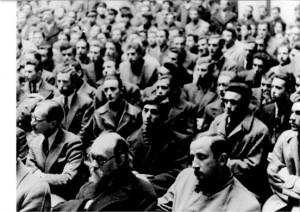NASEP is pleased to announce that we are now beginning to migrate the contents of our Reading Room to the Open Commons of Phenomenology platform (along with the NASEP blog itself). We want to thank all of our users for supporting and promoting the contents of our Reading Room, and we look forward to expanding our collection during the migration process.
As we make our move, we will be updating you on new additions to the Reading Room as we have in the past. We apologize that new material has been slow to appear over the past few months.
The first set of writings to move over to the OPhen platform are those of Ernst von Aster. More items will be added to von Aster’s bibliography as we receive them.
Ernst von Aster was born in Berlin on 18 February 1880. In the summer semester of 1898, von Aster began his university education in Berlin studying mathematics, natural science, and philosophy. He later moved to the University of Munich where he studied under Hans Cornelius and Theodor Lipps, and was an active member of the Psychologische Verein. He completed his dissertation with Lipps on 25 May 1902. The dissertation, Über Aufgabe und Methode in den Beweisen der Analogien der Erfahrung in Kants Kritik der reinen Vernunft, was published in the Archiv für Geschichte der Philosophie in 1903. Von Aster remained in Munich to write his Habilitation thesis, Untersuchungen über den logischen Gehalt des Kausalgesetzes, which he completed on 24 July, 1905.
In the summer semester of 1906, von Aster began teaching at the rank of Privatdozent in Munich (his first courses were Grundzüge der Ethik and Über Wesen und Aufgabe des psychologischen Experiments und der psychologischen Beobachtung). Sometime in August 1912, he was promoted to the rank of Associate Professor of Philosophy (though the university course calendar does not reflect this change in status until summer semester 1913). He remained in Munich until WS 1920/21, at which point he became the successor of Hermann Siebeck as the chair of Philosophy and Pedagogy at the University of Giessen.
After the National Socialist party came to power in 1933, von Aster lost his chair at Giessen for being a Social Democrat, and fled to Sweden. In 1936, von Aster was appointed full Professor at the University of Istanbul. Edmund Husserl wrote a letter of recommendation on his behalf. Von Aster died in Stockholm on 22 October, 1948.
For more information on Ernst von Aster, see:
- Hans Michael Baumgartner. 1981. Unbeirrbarkeit und Würde der Philosophie. Zum Gedächtnis des 100. Geburtstages von Ernst von Aster. Zeitschrift für philosophische Forschung 35:2, 259-263.
- Regine Mader. 1981. Bibliographie Ernst von Aster (1880-1948). Zeitschrift für philosophische Forschung 35:2, 263-267

